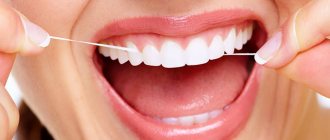The appearance in a patient of such a repulsive condition as the smell of urine from the mouth is due to many factors, which include both the use of medications and the development of serious pathological processes in the patient’s body. It is highly not recommended to ignore such a disorder in a person’s condition, since it often becomes a harbinger of changes in the body that can later have an extremely negative impact on a person’s health. First of all, if you smell urine from your mouth, you should consult a doctor, who, if necessary, will prescribe an additional medical examination.
Bad breath: physiology or disease?
Bad breath
in medical language it is called
halitosis
. There are physiological and pathological halitosis. Bad breath often appears in the morning. During the night, bacteria and their metabolic products accumulate in the mouth, which causes a bad odor. This type of halitosis is physiological and can be eliminated by simply brushing your teeth. Physiological halitosis also includes odor caused by eating a number of foods, such as garlic, onions, cabbage. This smell will disappear on its own as soon as the substances that caused it are eliminated from the body. But it also happens that an unpleasant odor is not eliminated using hygiene procedures; in this case, most likely, it is of a pathological nature.
Bad breath: causes
The most common cause of unpleasant odor is the active activity of pathological bacteria in the oral cavity. Diseases such as caries, periodontitis, pulpitis, periodontitis, gingivitis, stomatitis, as well as the formation of tartar can lead to persistent bad breath.
The second place among the causes of unpleasant odor is dry mouth (the medical term is xerostomia
). Mica, which moisturizes our mouth, has bactericidal properties. It kills bacteria, neutralizes their waste products, rinses and cleanses the oral cavity. If there is not enough saliva produced, bacteria are activated, resulting in an odor. Dry mouth can be a consequence of illness or taking a number of medications. It can also be caused by age: over time, the salivary glands begin to work less intensively, the composition of saliva changes, and its antibacterial properties are lost.
The smell can also be caused by ENT diseases: sore throat, chronic tonsillitis, sinusitis, runny nose.
Another cause of unpleasant odor is diseases of the internal organs. It can be:
- renal failure;
- liver failure;
- gastric diseases (gastritis, stomach ulcer);
- lung diseases.
Smoking is also a cause of persistent bad breath. The smell is caused by substances contained in tobacco smoke and deposited in the oral cavity. The only way to eliminate the unpleasant odor in this case is to quit smoking.
What is bad breath like?
Peculiarities of odor can indirectly indicate the source of problems.
Hydrogen sulfide smell
(the smell of rotten eggs) indicates rotting protein substances. This smell is typical for digestive problems. A persistent hydrogen sulfide odor may indicate gastritis with low acidity or a stomach ulcer.
Sourish smell
and a corresponding taste in the mouth is noted with gastritis with high acidity. This smell may appear at an early stage of the disease, when other symptoms are not yet present.
Bitter smell
and the taste in the mouth is typical of liver and gallbladder diseases. An additional symptom is the appearance of a yellow coating on the tongue.
Smell of acetone
and the accompanying sweet taste in the mouth is a characteristic symptom of diabetes.
Urine smell
from the mouth indicates a disease of the genitourinary system (primarily the kidneys or bladder).
Stool smell
from the mouth can occur due to intestinal diseases (dysbacteriosis, intestinal dyskinesia, intestinal obstruction).
Putrefactive
bad breath is typical for dental diseases (inflammatory processes of teeth and gums).
Causes of bad breath
There is a whole list of factors that can affect the formation of an unpleasant odor in urine. Among the most common reasons are the following:
- inflammation localized in the tonsils;
- infectious pathologies affecting the respiratory tract;
- insufficient hygienic oral care;
- development of caries;
- inappropriately composed daily menu;
- dry mouth.
The development of caries affects the appearance of odor in the mouth
The development of bad odor in the mouth is also affected by taking medications, which include antihistamines, sedatives, decongestants and some other drugs. Such medications inhibit the process of salivation, which causes the throat and mouth to dry out, which causes a stink.
In some cases, the appearance of a bad odor is accompanied by the formation of plaque on the tongue, as well as an unpleasant taste when eating food. In cases where a person consumes food quite rarely, and also violates the drinking regime (the amount of liquid consumed is much lower than necessary), this negatively affects the functioning of the urinary system, which is expressed in the appearance of urine odor from the mouth.
Kidney pathologies
The most disgusting manifestation of diseases of this nature is the smell of urine from the mouth, which most closely resembles the specific aroma of ammonia. If there are abnormalities in the functioning of the kidneys (failure of these organs or diseases of an infectious nature), in addition to the appearance of an unpleasant odor from the mouth, a person begins to feel worse, mental and physical activity decreases, and a general malaise appears, causing constant discomfort. The problem occurs when:
- Pyelonephritis. This is the process of inflammation in the kidneys.
- Urolithiasis. The formation of oxalates and urates, which interfere with the outflow of fluid from the body.
- Kidney failure. The kidneys lose their ability to accumulate and remove fluid, which often leads to a malfunction of all body systems.
Urolithiasis disease
In cases where the progress of the disease is at one of the last stages, the smell of urine from the mouth of a child or adult intensifies and is very pronounced. In kidney diseases, this is primarily due to the fact that the tubules of these organs are damaged, which causes deviations in the process of protein metabolism. In this case, the uremic smell becomes a herald of a metabolic disorder in the human body, due to which waste products leave the body through the respiratory tract. At the same time, despite the pronounced smell of ammonia, there are completely no toxic compounds in the air exhaled by a person. Therefore, if your breath begins to stink and the smell cannot be removed with standard hygiene products, you should immediately consult a doctor.
Recommended topic:
Smell of urine after eating asparagus
Infections
In a predominant number of cases, respiratory tract diseases that are caused by bacteria or viruses (these primarily include sore throat, influenza and ARVI), that is, infectious in nature, lead to an increase in the level of ammonia and urea in the patient’s blood, which is caused by metabolic disorders substances. In addition, due to damage to the mucous membranes, which dry out over time, the production of saliva, as well as the bactericidal enzyme lysozyme, decreases, which is why the proliferation of microorganisms that influence the appearance of an unpleasant odor flourishes.
When infectious diseases occur in the oral cavity, due to which the smell of urine appears from the mouth, the characteristic signs of the pathological process are redness, swelling and bleeding of the gums, especially after hygiene procedures using a toothbrush or dental floss. Often this condition is accompanied by the formation of purulent discharge between the teeth, as well as the appearance of an abscess (abscess) in the mouth. The teeth begin to become loose, and in the most advanced cases they even fall out. Ulcerative wounds also appear on the tongue or gums.
Pathological processes of an infectious nature located in the respiratory tract are mainly expressed by redness of the throat, swollen lymph nodes in the neck, increased body temperature, signs of chills, green or yellow nasal discharge, as well as a cough accompanied by sputum.
High sugar levels (diabetes)
Among all diseases of the endocrine system, diabetes mellitus, which is often accompanied by abnormalities in the metabolic process in the body (and we are not just talking about carbohydrates), can cause the appearance of urine odor from a person’s mouth. In most cases, a fruity aroma is detected from the patient’s mouth, but in the most severe cases (for example, with hyperglycemic coma) in people suffering from diabetes, a strong odor of ammonia or acetone is observed in the mouth. In this case, the patient experiences dry mouth, unquenchable thirst, due to which the amount of fluid consumed and excreted increases, and also sometimes loses consciousness.
Elevated sugar levels
This disease is one of the most dangerous, which can be manifested by the appearance of an uncharacteristic odor from the mouth. Due to too few symptoms, the patient’s condition gradually becomes critical, and the smell of urine from the mouth becomes a sign of the development of coma. In this case, the patient experiences an excessive amount of glucose excreted by the organs of the urinary system. General weakness and nausea also become characteristic symptoms in this case. Similar clinical manifestations are also characteristic of other diseases of a systemic nature, including those affecting the liver, kidneys, lungs and other organs.
Poor nutrition
Lack of balance in the daily diet also affects the appearance of bad breath. As is known, urea and ammonia are products of the breakdown of proteins, which is why when using a protein diet, in which there are practically no fats and carbohydrates, an increased amount of such substances enters the blood. That is why most nutritionists recommend creating a menu that maintains the proportions of proteins, fats and carbohydrates. In this case, an important role is played by the presence of physical activity, which helps to activate the metabolic process (if there is a lack of it, you should do basic exercises from the school course).
Recommended topic:
Urine smell in women
Poor nutrition
In this case, selecting food products that will reduce the load on the body’s systems will have a positive effect on the body’s condition and help get rid of the unpleasant odor. In this case, you should limit your consumption of unhealthy foods as much as possible, increase the amount of fluid consumed (normalize your drinking regime) and normalize the amount of carbohydrates consumed.
Gastritis or pancreatic diseases
Diseases of the gastrointestinal tract (in a predominant number of cases this is gastritis, but duodenitis, intestinal dysbiosis and cholecystitis are also noted) also affect the formation of unpleasant odor from a person’s mouth. However, it may not only be the smell of urine. The real stench of hydrogen sulfide, more often used to describe rotten eggs, indicates the processes of rotting proteins in the body. Its cause is deviations in the digestion process, which is why such a aroma becomes persistent. This manifestation most often becomes a sign of the development of gastritis with low acidity or stomach ulcers.
If the patient has a sour smell, which is accompanied by the same taste in the mouth, we are talking about the development of gastritis with high acidity. A similar sign of this disease often appears at one of the early stages of the disease, when it is not accompanied by other signs of the development of the pathological process.
Dehydration
The appearance of urine odor in the mouth is most often observed in children who do not take in enough liquid during the day, which causes dehydration, which is accompanied by the appearance of an unpleasant odor during breathing. In this case, parents should also pay attention to the condition of their child’s teeth and gums, since the development of caries and stomatitis (and other infectious diseases localized in the oral cavity) can cause a change in the aroma of exhaled air.
Bad breath: what to do?
The fight against bad breath begins with careful adherence to good oral hygiene. If the source of the odor is bacterial activity, proper brushing of your teeth will help. Teeth should be brushed not only from the outside, but also from the inside, and also treat the chewing surface of the teeth. The brush angle should be 45°. Using dental floss, hard-to-reach areas between teeth are treated. If your teeth are in poor condition, simply brushing your teeth will not solve the problem. You will need to visit a dentist and remove tartar, and if your teeth have caries, cure them. It is recommended to visit the dentist at least once or twice a year.
It is also necessary to combat dryness of the oral mucosa. If you feel dry mouth, take a few sips of water and rinse your mouth. However, it should be remembered that frequent dry mouth can be a symptom of serious diseases. However, like the unpleasant smell itself. Therefore, if you have persistent bad breath, you should definitely see a doctor and undergo an examination.
Ammonia odor in a child
In cases where a baby or an older child has an unpleasant stench from the mouth every day, and sometimes even smells of ammonia or urine, most often we are talking about non-compliance with the rules of personal hygiene or a violation of the drinking and eating regime, which can be easily corrected. However, parents do not need to ignore such a change in the child’s condition, especially if it is accompanied by a deterioration in the baby’s well-being and the appearance of complaints. In this case, you should immediately consult a doctor to rule out the development of diseases of the gastrointestinal tract, kidneys or diabetes.










